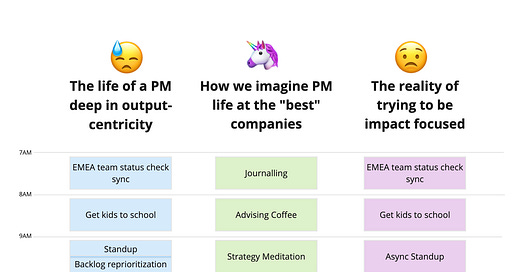When trying to understand where a team or company is at, one of the first things I do is talk to people about how they spend their time and energy. Words like empowered, feature factory, and outcome-oriented are squishy and can mean a million things. Behaviors don't lie (provided you make it safe for people to share reality). There are only so many hours in a week, and we have finite energy to do thoughtful work.
Teams that are further along their product journey...
Spend more time and energy:
Interacting directly with customers and conducting deliberate and disciplined research. Synthesizing that research as a team instead of channeling it through a single person.
Reviewing qualitative and quantitative data on how customers are using your products (and that guiding next steps and where you focus).
Collaborating with internal partners on an equal footing, not as a request taker. Building shared understanding around the opportunities you hope to tackle and why they will benefit customers and the company.
Engaged in healthy debate on the way forward. Pressure testing ideas. Healthy skepticism. Participatory design. If needed, explore and refine multiple options and paths forward. Return to the drawing board (if required). Operate as a team and as a workgroup.
Communicating, listening to, and absorbing business context
Talking about things that actually shipped or will be shipping soon. Getting stuff in front of customers that they can touch and respond to. Celebrating "real" progress.
Working with internal partners to minimize customer disruption and make releases and launches as smooth as possible. Treat the company—how you sell, market, support, and partner—as an extension of "the product."
Revisiting assumptions and recalibrating confidence levels given new inputs. Gradually building conviction vs. forcing it. Getting key context into writing and inviting critique and review.
Reworking things for the benefit of customers. Removing features.
Making decisions that stick long enough to take action
Extended periods of focused individual and collaborative work
Talking about what customers can now accomplish, and sharing real stories from real customers and what that has enabled and made possible
And spend less time and energy:
Estimating work (specifically for filling up timeboxes, making "delivery commitments," etc., that don't directly provide customer value).
Triaging and responding to internal feature requests
Scrounging for data, only to find out that it isn't usable—this happens to everyone, but a bit more in certain cases
Providing updates to people whose primary interest is synthesizing and passing along the information to other people vs. providing helpful (and educated) feedback
Coordinating dependencies with other teams, handing off work, and spending time wrapped up in complex project management. Playing a complex game of Tetris. Worrying about "allocating capacity" and figuring out more elaborate ways to keep everyone busy and maximize output.
Prematurely converging on detailed specifications as part of planning activities to "pass" arduous internal review processes. Getting overly specific on work more than a couple of months out. Continuously replanning longer time horizons instead of keeping things more directional. Talking about things far off in the future. Waiting on feedback. Waiting for direction. Waiting for permission and "sign-off"
Dealing with urgent reactive work (e.g., outages, rollbacks, etc.). Feeling the pain of debt friction vs. addressing the problem. Repeated workarounds.
Navigating proxies—e.g., working with an engineering manager instead of with engineers directly or talking to a PM so they can pass on information to a designer
Focused on a single customer (unless they are an early design partner)
Making decisions that quickly go stale and don't survive until the next strategic/tactics shift. Negotiating consensus across multiple partners (and ending up with a mediocre way forward).
General context switching—you have too much going on and waste time hopping between work.
Talking about all the things you've delivered (even that might be a step up because in many cases, it is talking about things that never get delivered and never get nixed)
What shapes where your team spends its energy and time?
Do you have any opportunities to shift where your team invests its time and energy?
What is one thing you could advocate stop spending so much time on?
To lighten the mood, here’s a brief reminder that even small shifts in your calendar can be an improvement!





Love the illustration!
Just two days so, I wrote about Success Activities vs Distracting Activities: https://www.leadinginproduct.com/p/success-activities-vs-distracting-activities
This is somewhat similar!